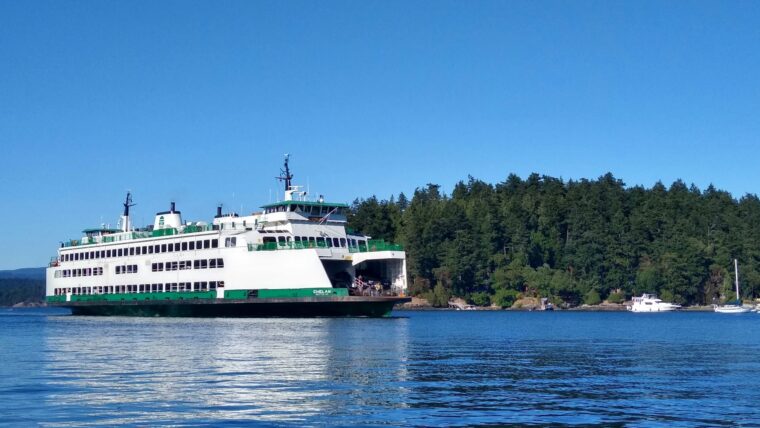
The U.S. Federal Transit Administration recently awarded $300 million for upcoming projects designed to expand and modernize the nation’s ferry systems. Specifically, the funding will support 18 new projects in 14 states, including replacing old vessels with electric ships, upgrading the waterfront facilities and modernizing the systems with technology.
Alaska’s Department of Transportation was recently awarded three funding awards totaling more than $177 million to support upcoming projects. The largest one will require $33 million in revenue and will be designed to replace the diesel-powered Tustumena Ferry that serves rural southwest Alaska and expand the ferry’s infrastructure. The new vessel’s propulsion system will be updated with a diesel-hybrid design incorporating batteries. When completed, the project will deliver improved service reliability, reduced greenhouse gas emissions and a modernized vital transit lifeline. The anticipated date for completion of all the work is early 2027.
A second grant of $66 million will be consolidated with other funding for an effort to improve operations on the Alaska Marine Highway System. This ferry transportation system serves 30 communities along 3,500 miles of coastline. The project will strengthen the state’s ferry system by adding route service to remote communities. Transportation improvements will include the development of new routes to rural communities, confirming that seasonal route schedules can accommodate travel and workforce demands, and performing preventative maintenance on vessels. The total project cost for this initiative is $89 million, and it has multiple phases of work to ensure the long-term stability of the highway system. The project is still in the pre-construction phase.
A third project with a lower price tag will receive $5 million in funding support. This project will install Wi-Fi on ferry vessels. The objective will be to provide and enhance port communication and improve operational efficiency for the entire ferry system.
The Vallejo Ferry Terminal in California will be reconfigured, and the federal government will support the project with approximately $16 million in funding. The effort will be designed to improve ferry operations and reduce environmental and operational disruptions caused by siltation in the Napa River. The project will mitigate frequent and costly dredging and decrease service interruptions for passengers.
The work will include both in-water and landside improvements. Passenger queuing areas will be expanded to reduce wait times, and other upgrades will be made to prepare the terminal for future zero-emission ferry operations. An ongoing environmental review and permitting process is expected to continue throughout 2024 and construction is currently slated to begin in 2025.
The Rock Island County Metropolitan Mass Transit District was awarded $8 million to support introducing a battery-electric ferry service and the required infrastructure along the Mississippi Riverfront. The effort will link Illinois and Iowa’s Quad Cities. The project will replace older, diesel-powered vessels with an all-battery-electric fleet, which will reduce emissions and fuel consumption and improve operational efficiency.
Project components will include constructing essential charging infrastructure and enhancing the dock structure to support electric ferry operations. Pre-construction activities are currently underway, and the ferry is expected to be fully operational by 2026. No date is currently selected for contracting documents to be issued.
The Jacksonville Transportation Authority secured $15.6 million from the FTA for a project to introduce a diesel hybrid-electric ferry that will connect Mayport Village and Fort George Island in Florida.
The project will include acquiring a new ferry, installing charging stations and upgrading all dock infrastructure. When completed, fuel consumption and harmful emissions will be reduced. The project is currently in the planning phase, and design work will continue through 2024. Construction contracting opportunities will be delivered in phases to allow the ferry to be operational while the work is underway. Procurement is scheduled for 2025.
The River and Bay Authority in Delaware will replace an aging diesel ferry connecting Cape May, New Jersey with a new diesel-hybrid vessel. The $29 million project will also include the construction of hybrid-supporting infrastructure, charging stations and dock improvements. The infrastructure improvements are essential to the ferry’s operation and efficiency. The new hybrid ferry will reduce fuel consumption by 35% and significantly lower carbon dioxide, nitrogen dioxide and other harmful emissions.
The project’s design work is currently underway and will be finalized by the end of 2024. Solicitation documents will be issued in early 2025.
The Maine Department of Transportation was awarded $16.6 million in funding support to modernize rural ferry terminals in Lincolnville and Islesboro, Maine. The terminals, originally built in 1959, will undergo significant upgrades, which include expanding the docking space and installing charging infrastructure to support the hybrid-electric ferry operations. The project will enhance the safety and reliability of ferry services and contribute to the state’s efforts to fight climate change by transitioning to low-emission vessels. The improvements will reduce fuel consumption by 90% and cut carbon emissions by over 900 metric tons annually.
The project’s design phase should be completed by late 2024 and solicitations for construction will be issued in 2025.
San Francisco Bay Ferry in California will procure the nation’s first high-speed battery-electric ferries. With the help of a federal transit grant of $11 million, three 150-passenger battery-electric vessels will be purchased to service the San Francisco Bay area.
The Bay Area’s waterfront is busy and thriving, and the new ferry will increase the region’s connectivity while adding another zero-emission transportation option.
Phase 1 will include a transformative suite of projects designed to transition the agency’s fleet to zero-emission propulsion technology. Future phases include two new 400-passenger battery-electric vessels, converting four diesel 400-passenger ferries to zero-emission technology, terminal electrification across the system, and expansion and electrification of the agency’s Central Bay Operations. Solicitation documents are planned for late 2024.
These upcoming projects will create additional demand for contractors interested in providing professional services, engineering, construction, technology, land work and equipment.
Photo by Kris DeBruine on Unsplash
The post New funding for projects to upgrade and modernize a different type of transportation appeared first on Government Market News.
